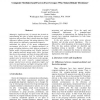Free Online Productivity Tools
i2Speak
i2Symbol
i2OCR
iTex2Img
iWeb2Print
iWeb2Shot
i2Type
iPdf2Split
iPdf2Merge
i2Bopomofo
i2Arabic
i2Style
i2Image
i2PDF
iLatex2Rtf
Sci2ools
112
Voted
HICSS
2002
IEEE
2002
IEEE
Computer-Mediated and Face-to-Face Groups: Who Makes Riskier Decisions?
Although a significant body of research has focused on understanding the effect of media differences on group behaviors and processes, little is known about how media differences influence groups' risk-taking behaviors. This study reports on a laboratory experiment designed to understand the effects of the group communication environment (face-to-face or computer-mediated) on group risk-taking behaviors while subjects performed a hidden profile decision-making task. Results indicated that computer-mediated groups make riskier decisions than face-to-face groups, and their decisions shift farther away from the positions held by individual group members prior to interaction than in face-to-face groups. Consistent with prior research, computer-mediated groups reported lower process satisfaction, higher and more even participation, and higher intra-group conflict. Two rival theoretical explanations are put forth as to why computer-mediated groups made riskier decisions.
| Added | 14 Jul 2010 |
| Updated | 14 Jul 2010 |
| Type | Conference |
| Year | 2002 |
| Where | HICSS |
| Authors | Joseph S. Valacich, Saonee Sarker, Jamie Pratt, Mike Groomer |
Comments (0)

